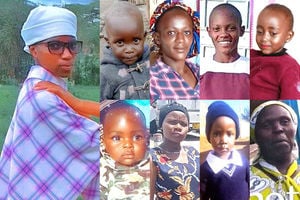Anti-Hassan campaign linked to top police job
Hassan Omar Hassan, the radical former student leader — now human rights defender — has stirred a hornet’s nest.
His comments about the Kikuyu occupying several public sector positions have sparked a robust debate, especially on unfettered blogs, on what is considered a taboo topic in certain quarters — ethnicity and distribution of key government jobs.
Some MPs and Government Spokesman Dr Alfred Mutua have asked the Kenya National Commission on Human Rights official to resign or be kicked out.
Three MPs have also demanded that Mr Hassan resign as chairperson of the National Police Service Commission selection panel.
Linked to fears
The Sunday Nation has established that Mr Hassan’s troubles are linked to fears that as chairperson, he will be opposed to appointment of candidates from Central Kenya to the police commission.
Front runners for posts in the commission include Ms Jean N. Kamau, Dr Migudo Winja, Ms Amina Masoud, Dr Erick Bor, Dr Hulda Ogoti, Mr Murshid Mohamed and Ms Margaret Cheboiwo.
Mr Hassan has accused President Kibaki of perpetuating ethnicity in a way that benefits those from Mt Kenya and declared that it is “highly unlikely” that Kenya’s next President will be a Kikuyu.
“You scar and bleed a nation when you wilfully negate its sensitivities. To pass the microphone from one Njoroge to another, then to Nyoike and Murungi while addressing the soaring costs of energy.
“Or when Ndung’u passes the microphone to Kinyua, then to Kenyatta to tell us why the shilling is losing ground. Or when the leadership of the country’s security apparatus is almost exclusively from Kibaki’s ethnic Kikuyu. Kenyans are not idiots,” Mr Hassan wrote last Sunday.
But while his critics accuse him of promoting hatred against the Kikuyu, his supporters say Mr Hassan is being vilified for speaking the “bitter truth”.
NGO Council chairman Ken Wafula has defended Mr Hassan and urged him not resign.
“He spoke on behalf of a majority of Kenyans who are not brave enough to say the king is naked. This is a class issue as ordinary Kikuyus are not benefiting from the top jobs,” he said.
It is worth noting that Mr Hassan was instrumental in the filing of a report that linked key government officials and the police to the 2008 post-election violence.
President Kibaki has been accused of staffing key sectors, especially Finance, Energy, Transport and security agencies with people from the same region.
Apparently, Mr Hassan’s views are shared by influential Judicial Service Commission member Ahmednasir Abdullahi.
The two are members of the panel interviewing candidates for the Police Service Commission, which will oversee the security sector, including the appointment of the next inspector general of police.
“Kibaki has, through a well thought-out government strategy, tribalised Kenya. Through an adroit design, he has staffed critical organs of State with certain ethnic groups to the exclusion of other Kenyans. The security and financial organs of the Kenya Government are dangerously mono-ethnic,” says Mr Abdullahi.
“It doesn’t augur well for the long-term stability of the country to appoint our generals and the top cadre of our security forces from one ethnic group.”
Police Commissioner Mathew Iteere is said to be interested in the post of inspector general while AP Commandant Kinuthia Mbugua has his eyes on the deputy inspector general’s post.
But Dr Mutua accused Mr Hassan of painting the Kikuyu community in a way that could create intolerance and promote hatred.
“People in government or positions of influence who ... use tribalism as a weapon to advance their own arguments should not be allowed to continue serving in positions of leadership,” he said on Wednesday.
In response, Mr Hassan told the BBC that “nobody in Kenya takes Dr Mutua seriously”.
Political activist Moses Kuria, who raised the alarm over Mr Hassan’s statements, says the proposition that a Kikuyu should not vie for the presidency was contrary to the Constitution.
“If this was the intention, the framers of the Constitution should have said that the provision excludes members of certain communities. But I welcome this open debate on ethnicity.”
However, Mr Wafula maintains that it is unfair to have more than 20 per cent of staff from one community in key ministries.
Once established, the Police Service Commission shall also hire the new director of the Criminal Investigations Department and will have express powers to undertake police promotions and transfers.




